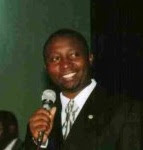by Ann Garrison
Joseph Ntawangundi, an assistant to Rwanda's FDU-Inkingi presidential candidate Victoire Ingabire Umuhoza, was arrested, imprisoned, and charged with the crime of genocide, on February 6th, three days after a mob in civilian clothes assaulted him, and Ingabiré, as the two of them waited for papers to register their party, and her candidacy, at a government office in Rwanda's capital city, Kigali. Ingabiré was uninjured in the assault, but assailants stole her passport and national identification papers. She will have to replace them before she can register for Rwanda's 2010 presidential election, though it now seems unlikely that she or any other candidate with any chance of winning will be allowed to run against the ruling Rwandan Patriotic Front Party's President Paul Kagame.
Leaders of the ruling RPF Party have been calling for Mrs. Ingabire's arrest for the crime of promoting "genocide ideology" ever since her return to Rwanda, from exile, on January 17th.
Leaders of the ruling RPF Party have been calling for Mrs. Ingabire's arrest for the crime of promoting "genocide ideology" ever since her return to Rwanda, from exile, on January 17th.
The Democratic Green Party of Rwanda has tried five times to convene, beginning in August 2009, only to be met with bureaucratic roadblocks and, on October 30th, violence and arrests, followed by more harrassment, threats and arrests. On February 5th, Interim Rwandan Green Party President Frank Habineza issued a press release stating that he had been accosted, threatened, and warned that he is being watched all the time. On 02.06.2009, Senegalese Green Party President Papa Meissa Dieng called on Global Greens and the American and European Greens Federations to act while there's still time by creating a mediation group to travel to Rwanda. Habineza also urged the Global Greens to act now.
The Parti Social-Imberakuri managed to register and nominate Mr. Bernard Ntaganda, but they've since been threatened with exclusion, and accused, like Mrs. Ingabiré, of promoting "genocide ideology."
The statute criminalizing "genocide ideology' was passed to suppress the disputed history of the 1994 genocide, which hangs heavy over Rwanda and this election. Mrs. Ingabiré has put herself at great risk simply by stating that not only Tutsi, but also Hutu people died in the genocidal massacres of 1994, but some American journalists, academics, have gone much farther in challenging the received history.
Rwanda has revoked University of Michigan Professor Allan Stam's VISA because of his collaborations with other academics, investigators, lawyers, and statisticians, and his conclusions that:
- a million people died,
- the vast majority of those who died were not Tutsi, but Hutu,
- American, French, and Belgian leaders, including Bill Clinton and the CIA knew what was happening every day as the massacres continued, and
- current Rwandan President Paul Kagame, a U.S. ally trained at Ft. Leavenworth, Kansas, is guilty of war crimes of an extraordinary scale.
Professor Stam also concludes that there are "no good guys in this story," no simple right and wrong.
Mrs. Ingabiré, the FDU-Inkngi Party's candidate, has called for a Truth and Reconciliation Commission, like South Africa's after apartheid.
Mrs. Ingabiré, the FDU-Inkngi Party's candidate, has called for a Truth and Reconciliation Commission, like South Africa's after apartheid.
The U.S. and its close ally, Rwanda
Secretary of State Hillary Clinton, speaking at the 2009 AGOA Conference in Kenya, called Rwanda the beacon of hope for Africa, and, in November 2009, President Bill Clinton presented Rwandan President Paul Kagame with a Global Citizenship Award. However, the U.S. State Department's Bureau of Democracy and Labor's May 2009 report tells a very different story:
"Rwanda is a constitutional republic dominated by a strong presidency. President Paul Kagame was elected to a seven-year term in 2003; the next presidential election is scheduled for 2010. Chamber of Deputies elections that took place in September 2008 were peaceful and orderly, despite irregularities. Significant human rights abuses occurred, although there were improvements in some areas. Citizens' right to change their government was restricted, and extrajudicial killings by security forces occurred. There were significantly fewer reports of torture and abuse of suspects than in previous years. Prison and detention center conditions remained harsh. Security forces arbitrarily arrested and detained persons. Prolonged pretrial detention was a problem, and government officials attempted to influence judicial outcomes, mostly regarding the community-based justice system known as gacaca. There continued to be limits on the freedoms of religion, speech, and association. Restrictions on the press increased. Official corruption was a problem. Restrictions on civil society, recruitment of child soldiers by a Democratic Republic of Congo-based armed group, and trafficking in persons, also occurred."








Very critical article, thank you so much for your work. Can you please enable the sharing features in your settings, so it can be easily shared on social networks. Bless you.
ReplyDeleteAnn Garisson, whats your biff with Rwanda? your partisan human rights campaign isnt doing any good for Rwanda. Why then do you just buzz of and let Rwandans just solve their problems? ever heard of us meddle in US politics? lower your imperial arrogance for once and use your energy to mind your own business, thank you
ReplyDeleteDear Ann,
ReplyDeleteA Scholar like you is not expected to publish mere hearsay. I eagerly went through your biased artical and found it baseless. If you have to capture global readership and attention, provide fact based articles or commit your invaluable energy and time to better academic use.
Joshua